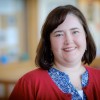This article is more than 5 years old.
Last week I attended the American Theological Library Association (ATLA) Conference in Denver. ATLA is always an excellent conference, and this year was no exception. I also had the opportunity to present here for the first time, sharing an expanded version of the presentation Ellen, Leslie, and I previously did on our LIB250 course. It was well received, and since it was scheduled in the first presentation slot of the conference, once it was over I could relax and concentrate on all of the other events!
The two most useful sessions I attended looked at free online resources for seminary students. Matti Myllykoski, from Helsinki University Library, walked us through the resources on New Testament manuscripts he had organized on his LibGuide page (you may need to click on the tab “Digital Archives and other Resources” for the dropdown link). Rather than just a list of links, of which there are many on this subject, his guide is in narrative form and places these works, their contributions, and their influences on each other, into context, which I found particularly helpful. In the second session, Harry Plantinga, a computer science professor from Calvin College, described the creation of a new database/website developed for preparing sermons and worship. Plantinga has already founded two useful websites, Christian Classics Ethereal Library and hymnary.org, and it was interesting to hear him discuss how his team is developing this new site, which should be in beta this Fall. Using actual catalogers, they are writing short descriptions and tagging relevant sites, with the goal of having a database that takes advantage of semantic searching and user preferences. He gave a useful illustration of how this can make a significant difference in search results using a search for Christmas hymns. In a database that displays results via relevance, the top 15 hymn titles and subject headings included the word “Christmas” but were completely unfamiliar songs, while a search that added the popularity of the hymn as a search criteria included many standard Christmas hymns, none of which include “Christmas” in the title. While I’m quite sure I don’t understand all of what he said (my summary likely reflects that!) it was valuable to hear about the construction of the website and the thinking that went into the concept and design.
Other sessions I attended included marketing the ATLA Religion Database to students and faculty, a survey of the design of religious studies LibGuides, using design thinking to teach seminary students information literacy, and the role of the theological librarian in formational theological education, and if you are interested in any of these topics, come see me! I wanted to highlight, however, two sessions that I feel are probably unique to attending ATLA and add to the benefit and knowledge I gain from attending, but aren’t explicitly related to librarianship. On Wednesday I attended a pre-conference tour organized by a librarian from Naropa University in Boulder (check it out, it is a Buddhist university co-founded by Allen Ginsberg!). We visited the Radha Krishna Temple, had lunch at their vegan restaurant, and then moved on to the Tri-State Denver Buddhist Temple. At both temples, we spoke with spiritual leaders who gave us tours, explained aspects of their traditions and their practice in both their “home” countries and the U.S., and answered our questions. I had not had the opportunity to be in the worship spaces of either of these traditions before, so this was a special experience for me, and will be helpful as I learn more about both traditions in the future. On Friday, the morning plenary session was a panel discussion on interfaith initiatives in Denver, with representatives from four faith traditions (Reconstructionist Judaism, Disciples of Christ, Islam, and Jodo Shinshu Buddhism). The panelists spoke about initiatives and programs they are undertaking together, both as institutions and organizations, and on a personal level, as well as areas where more growth and collaboration are needed. The quote most likely to stay with me from this conference was from the moderator of the panel, “Interfaith interest generally comes from two places: curiosity or crisis. If it comes from curiosity, it may stave off the crisis.” With the event in Charleston fresh in everyone’s minds, this was an emotional, impactful, and necessary session. Again, I would be glad to discuss either of these experiences, so let me know if you have questions!

3 Comments on ‘Kaeley at ATLA 2015’
Great post, Kaeley! Sounds like an incredible conference. I had never heard of Naropa University (so very interesting!), and I’m a little jealous about your temple visits. The restaurant site looked like a Lauren Pressley destination restaurant! Thanks for sharing your experience!
Sounds like a great conference – I love hearing from conferences that are so discipline specific – gives a great perspective!
I love hearing about the offering of discipline- focused conferences, it sounds like you can really do “deep dives” way more than is possible at ALA! Thanks for reporting on ATLA.